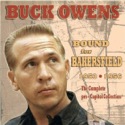
Buck Owens
Bound For Bakersfield: The Complete Pre-Capitol Collection 1953 to 1956
Rock Beat Records
Ages ago, there was “Country” and there was “Western.” “Western” music came from the ranchero culture of the southwest – a Spanish guitar soothed the cattle at night and entertained the cowpokes in the dark nights out on the plains. “Country” music originated in 16th century England and used the violin / fiddle to reproduce working class music as settlers spread into the isolated Appalachian Mountains. Around WW2 these styles collided and spun out two even more vital forces: “Rock and Roll” for the kids, and the “Nashville Sound” for their parents. I grew up with both, and still have fond memories of hearing Hank Williams and Hank Snow and Johnny Cash as the adults bashed The Beatles and The Stones as “that hippy crap.” In the middle of these transformations we find Buck Owens: clean cut, unique vocals, and a monosyllabic first name ending with a hard consonant. How could he miss?
His first label was Pep Records, and most of his Pep singles failed to sell. Owens was doing backup for Capitol artists and attracted A&R attention, and eventually grew into the hot hit maker we know today. But back in the Pep days this is what he sounded like: earthy, formidable, and promising. “Bound For Bakersfield” is raw, and out of the 24 tracks there are only 16 titles – you get two takes on most everything here.
On opener “Blue Love,” Owens issues complex and strident commands to the piano player: “I want less piano, but outstanding piano,” and the poor quality tells me this take was either a wire recorder or poorly stored acetate. “Down on the Corner of Love” sounds cleaner, but only to beat-up-yard-sale-LP quality. But no matter how rough the acoustics are, Owens’ voice has the southern drawl and operatic range that still gets your attention, just like Sid Vicious on a Sex Pistols bootleg. Behind him we hear a steel guitar and a Fender Telecaster. A minimal drum kit and a honky tonk piano appear on “Hot Dog,” but you’ll ignore them and focus on Owens. As you run though the multiple takes, all sound different; he and his producer were experimenting on fitting Owens’ voice to the alien lyrics.
Did Owens change the world? No. Did he change country and western music? No. As more the integrator than the innovator, his solid voice, musicianship, and personal charm made him a pillar of the style, and his co-hosting the hit TV show Hee Haw for two decades made him the face of C&W to millions who preferred… Lawrence Welk?
Rock Beat: http://www.rockbeat.com












